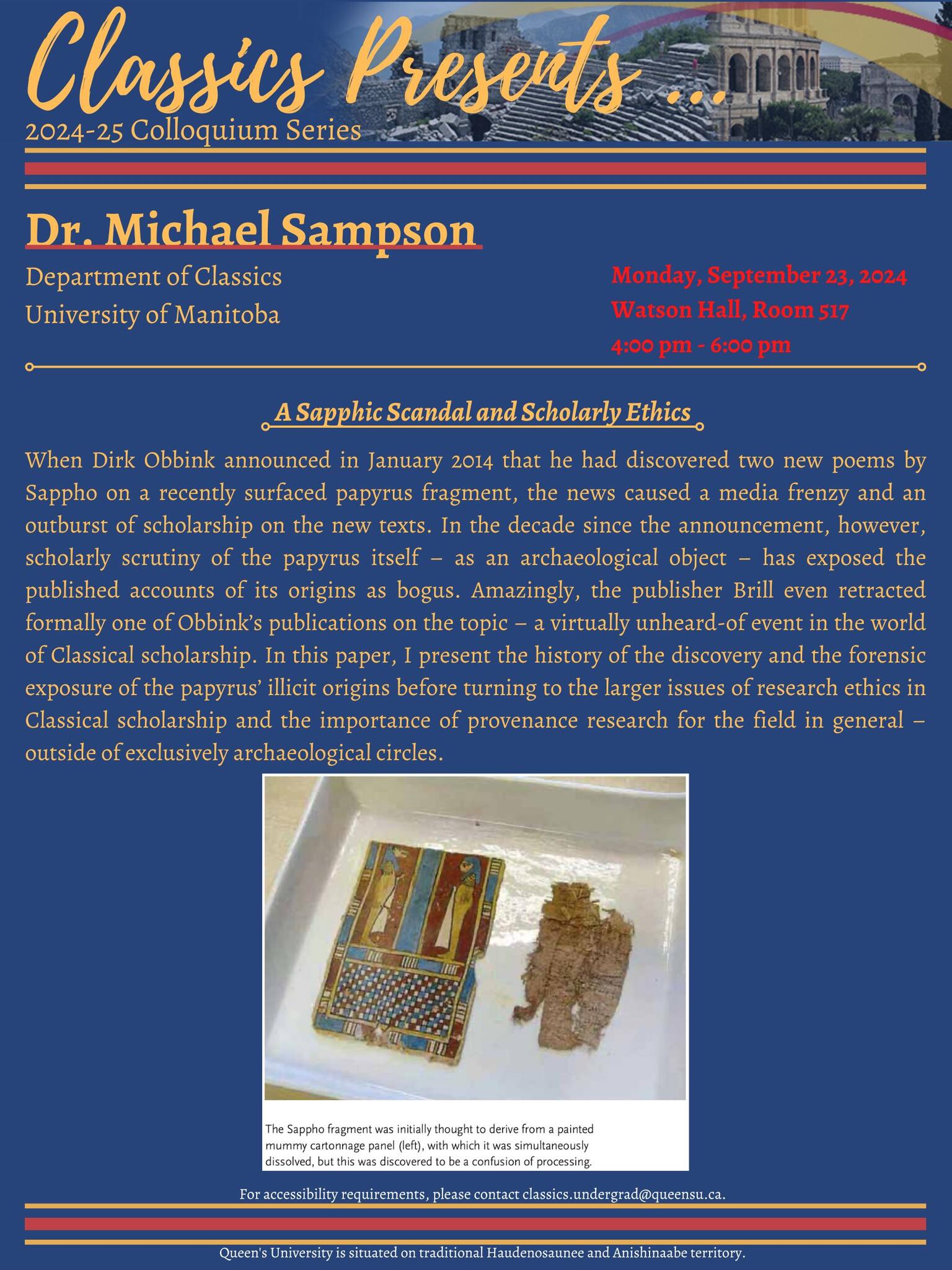Fall 2024
Dr. Michael Sampson
Department of Classics
University of Manitoba
Monday, September 23rd, 2024 from 4:00 - 6:00 pm, in Watson Hall Room 517
A Sapphic Scandal and Scholarly Ethics
When Dirk Obbink announced in January 2014 that he had discovered two new poems by Sappho on a recently surfaced papyrus fragment, the news caused a media frenzy and an outburst of scholarship on the new texts. In the decade since the announcement, however, scholarly scrutiny of the papyrus itself – as an archaeological object – has exposed the published accounts of its origins as bogus. Amazingly, the publisher Brill even retracted formally one of Obbink’s publications on the topic – a virtually unheard of event in the world of Classical scholarship. In this paper, I present the history of the discovery and the forensic exposure of the papyrus’ illicit origins before turning to the larger issues of research ethics in Classical scholarship and the importance of provenance research for the field in general – outside of exclusively archaeological circles.
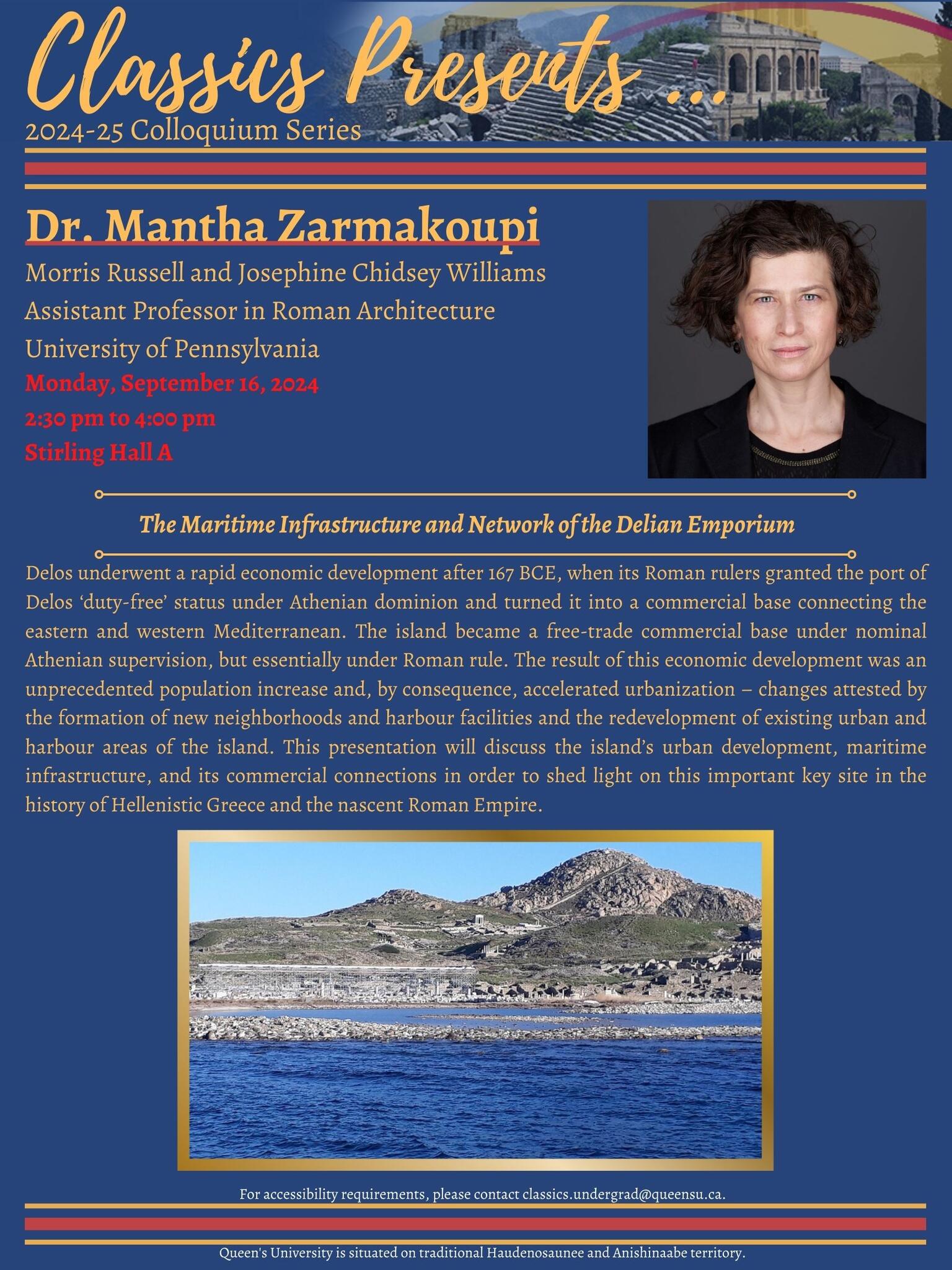
Dr. Mantha Zarmakoupi
Morris Russell and Josephine Chidsey Williams
Assistant Professor in Roman Architecture
University of Pennsylvania
Monday, September 16th, 2024 from 2:30 - 4:00 pm, in Stirling Hall Room A
The Maritime Infrastructure and Network of the Delian Emporium
Delos underwent a rapid economic development after 167 BCE, when its Roman rulers granted the port of Delos ‘duty-free’ status under Athenian dominion and turned it into a commercial base connecting the eastern and western Mediterranean. The island became a free-trade commercial base under nominal Athenian supervision, but essentially under Roman rule. The result of this economic development was an unprecedented population increase and, by consequence, accelerated urbanization – changes attested by the formation of new neighborhoods and harbour facilities and the redevelopment of existing urban and harbour areas of the island. This presentation will discuss the island’s urban development, maritime infrastructure, and its commercial connections in order to shed light on this important key site in the history of Hellenistic Greece and the nascent Roman Empire.
Winter 2024
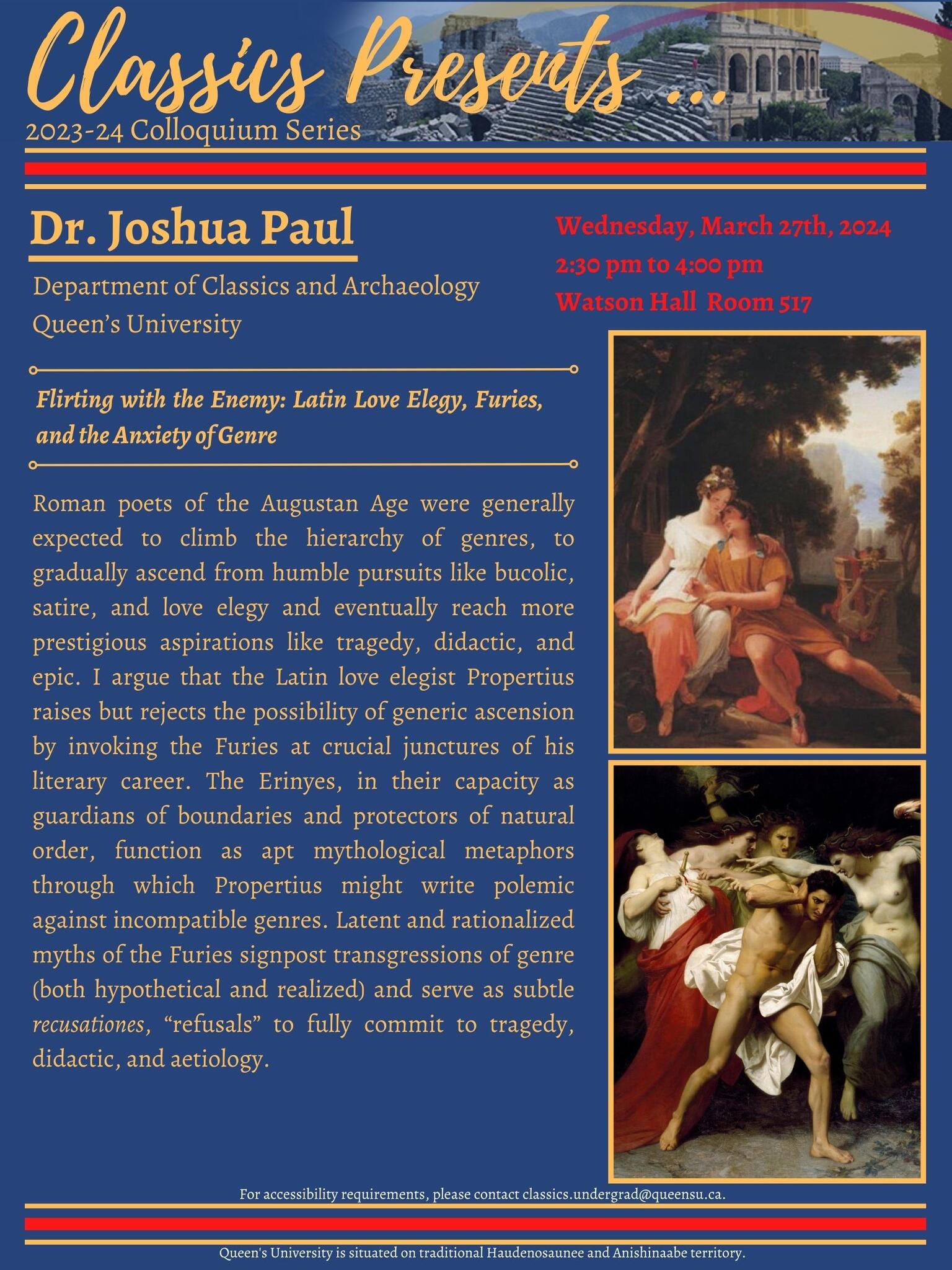
Dr. Joshua Paul
Wednesday, March 27th, 2024 from 2:30 - 4:00 pm, in Watson Hall Room 517
Flirting with the Enemy: Latin Love Elegy, Furies, and the Anxiety of Genre
Roman poets of the Augustan Age were generally expected to climb the hierarchy of genres, to gradually ascend from humble pursuits like bucolic, satire, and love elegy and eventually reach more prestigious aspirations like tragedy, didactic, and epic. I argue that the Latin love elegist Propertius raises but rejects the possibility of generic ascension by invoking the Furies at crucial junctures of his literary career. The Erinyes, in their capacity as guardians of boundaries and protectors of natural order, function as apt mythological metaphors through which Propertius might write polemic against incompatible genres. Latent and rationalized myths of the Furies signpost transgressions of genre (both hypothetical and realized) and serve as subtle recusationes, “refusals” to fully commit to tragedy, didactic, and aetiology.
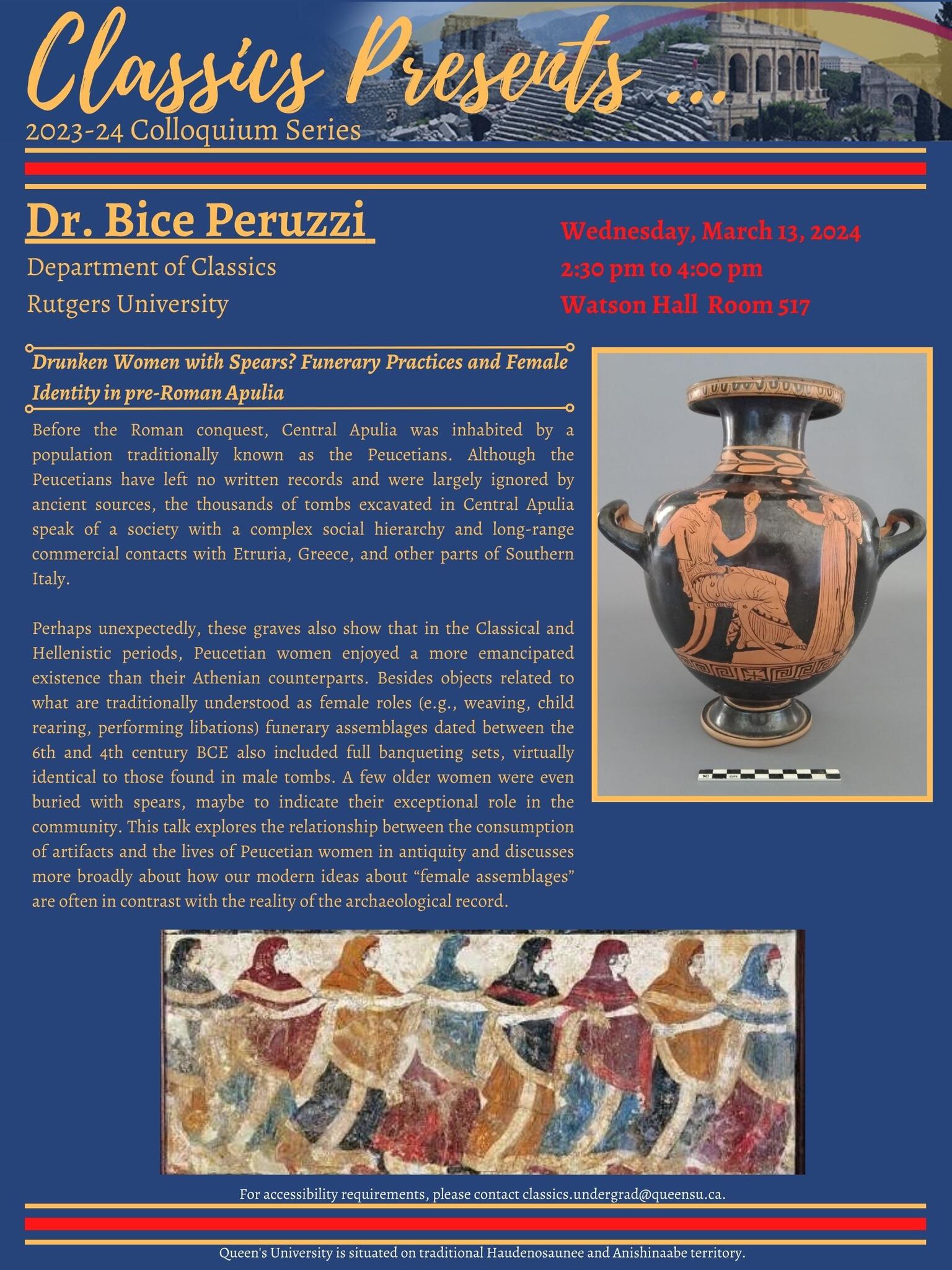
Dr. Bice Peruzzi
Wednesday, March 13th, 2024 from 2:30 - 4:00 pm, in Watson Hall Room 517
Drunken Women with Spears? Funerary Practices and Female Identity in pre-Roman Apulia
Before the Roman conquest, Central Apulia was inhabited by a population traditionally known as the Peucetians. Although the Peucetians have left no written records and were largely ignored by ancient sources, the thousands of tombs excavated in Central Apulia speak of a society with a complex social hierarchy and long-range commercial contacts with Etruria, Greece, and other parts of Southern Italy.
Perhaps unexpectedly, these graves also show that in the Classical and Hellenistic periods, Peucetian women enjoyed a more emancipated existence than their Athenian counterparts. Besides objects related to what are traditionally understood as female roles (e.g., weaving, child rearing, performing libations) funerary assemblages dated between the 6th and 4th century BCE also included full banqueting sets, virtually identical to those found in male tombs. A few older women were even buried with spears, maybe to indicate their exceptional role in the community. This talk explores the relationship between the consumption of artifacts and the lives of Peucetian women in antiquity and discusses more broadly about how our modern ideas about “female assemblages” are often in contrast with the reality of the archaeological record.
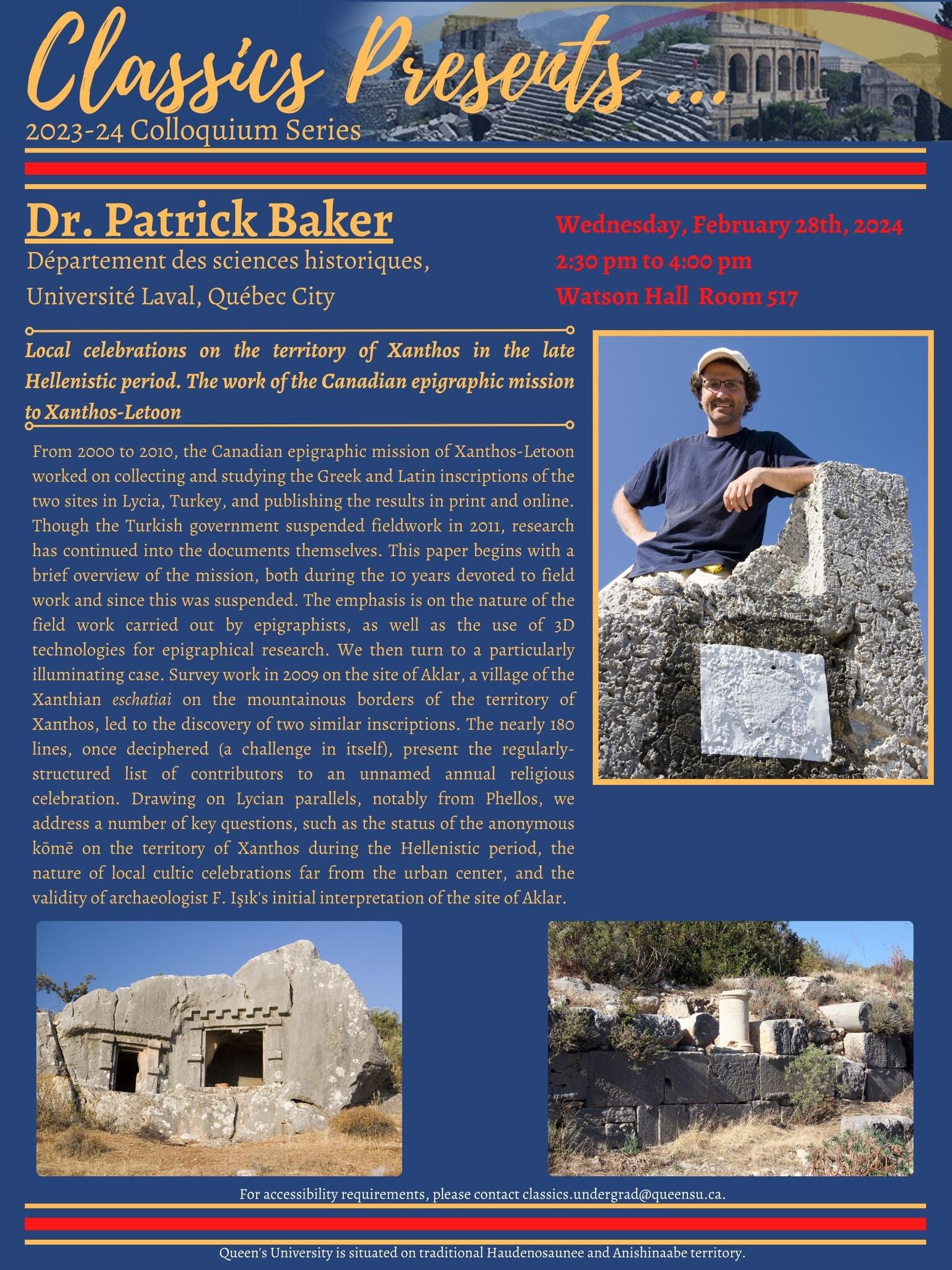
Dr. Patrick Baker
Wednesday, February 28, 2024, from 2:30 pm - 4:00 pm in Watson Hall Room 517
Local celebrations on the territory of Xanthos in the late Hellenistic period. The work of the Canadian epigraphic mission to Xanthos-Letoon
From 2000 to 2010, the Canadian epigraphic mission of Xanthos-Letoon worked on collecting and studying the Greek and Latin inscriptions of the two sites in Lycia, Turkey, and publishing the results in print and online. Though the Turkish government suspended fieldwork in 2011, research has continued into the documents themselves. This paper begins with a brief overview of the mission, both during the 10 years devoted to fieldwork and since this was suspended. The emphasis is on the nature of the fieldwork carried out by epigraphists, as well as the use of 3D technologies for epigraphical research. We then turn to a particularly illuminating case. Survey work in 2009 on the site of Aklar, a village of the Xanthian eschatiai on the mountainous borders of the territory of Xanthos, led to the discovery of two similar inscriptions. The nearly 180 lines, once deciphered (a challenge in itself), present the regularly-structured list of contributors to an unnamed annual religious celebration. Drawing on Lycian parallels, notably from Phellos, we address a number of key questions, such as the status of the anonymous kōmē on the territory of Xanthos during the Hellenistic period, the nature of local cultic celebrations far from the urban center, and the validity of archaeologist F. Işık's initial interpretation of the site of Aklar.
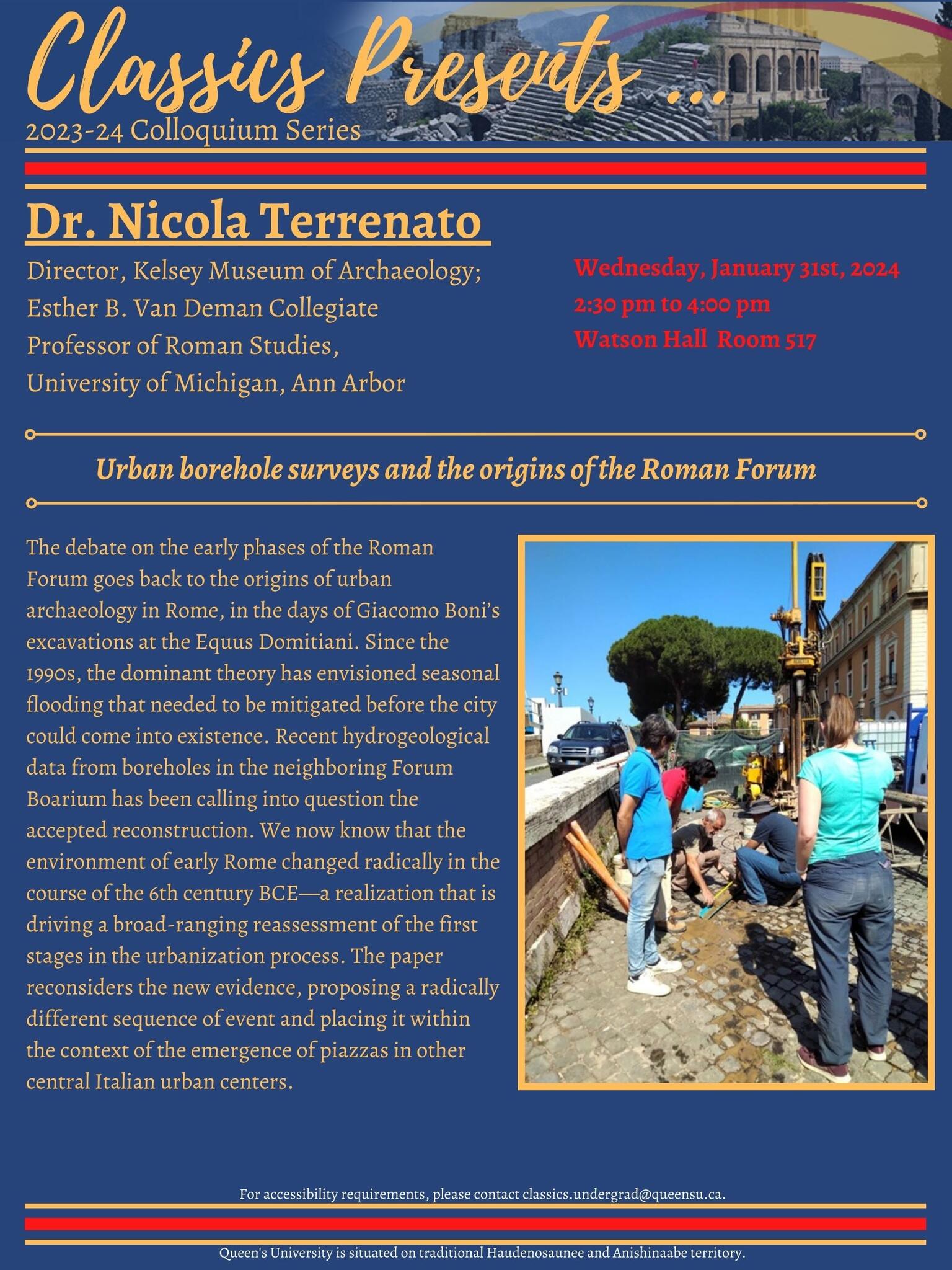
Dr. Nicola Terrenato
Wednesday, January 31st, 2024, from 2:30 pm - 4:00 pm in Watson Hall Room 517
Urban borehole surveys and the Origins of the Roman Forum
The debate on the early phases of the Roman Forum goes back to the origins of urban archaeology in Rome, in the days of Giacomo Boni’s excavations at the Equus Domitiani. Since the 1990s, the dominant theory has envisioned seasonal flooding that needed to be mitigated before the city could come into existence. Recent hydrogeological data from boreholes in the neighboring Forum Boarium has been calling into question the accepted reconstruction. We now know that the environment of early Rome changed radically in the course of the 6th century BCE—a realization that is driving a broad-ranging reassessment of the first stages in the urbanization process. The paper reconsiders the new evidence, proposing a radically different sequence of events and placing it within the context of the emergence of piazzas in other central Italian urban centers.
Fall 2023
Dr. Jitse H.F. Dijkstra
Wednesday, November 22, 2023, from 2:30 pm - 4:00 pm in Watson Hall Room 217
Digital Humanities in Action: The Philae Temple Graffiti Project
Classics may seem like a stuffy field, but in the last couple of decades the ‘digital turn’ has not failed to have its effect and digital tools have become common, especially at the intersection with archaeological fieldwork. In this lecture, Prof. Dijkstra will present the preliminary results of such a project that is advancing the study of ancient graffiti, the Philae Temple Graffiti Project. Philae, a famous temple island in southern Egypt, was one of the main sites for the cult of Isis in Graeco-Roman Egypt. Worshippers left thousands of textual and figural graffiti on the temple walls that provide us with a wealth of information about their personal piety. And yet, whereas the texts have mostly been studied, the figures have so far been completely ignored. The project fills this lacuna in scholarship by systematically recording and studying the figural graffiti. The lecture will highlight the use of advanced methods of recording and what they contribute to our knowledge of this temple site, and religion in Graeco-Roman Egypt more generally.
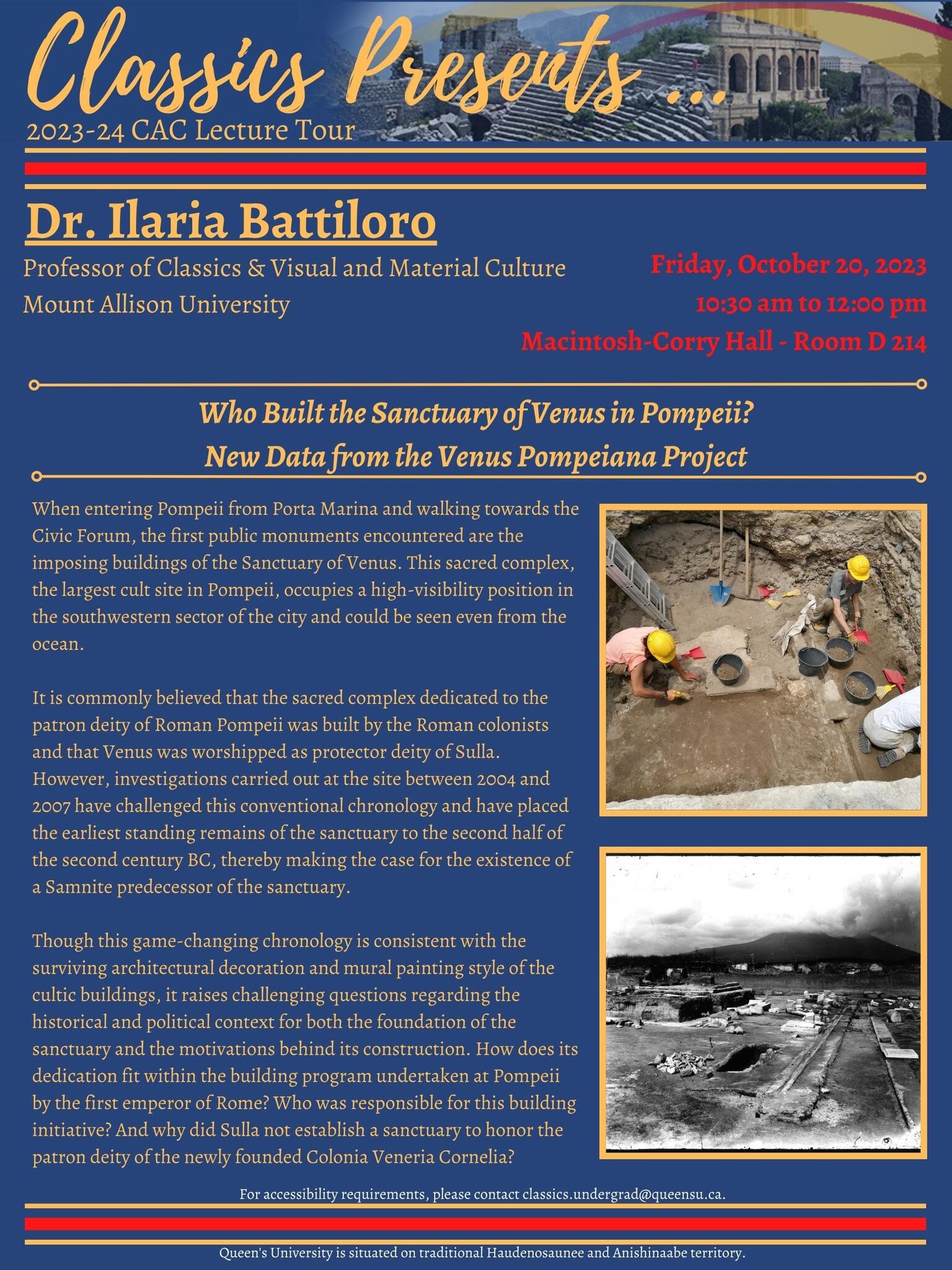
Dr. Ilaria Battiloro
Friday, October 20, 2023 from 10:30am - 12:00pm in Macintosh-Corry Hall - Room D 214
Who Built the Sanctuary of Venus in Pompeii? New Data from the Venus Pompeiana Project
When entering Pompeii from Porta Marina and walking towards the Civic Forum, the first public monuments encountered are the imposing buildings of the Sanctuary of Venus. This sacred complex, the largest cult site in Pompeii, occupies a high-visibility position in the south-western sector of the city and could be seen even from the ocean.
It is commonly believed that the sacred complex dedicated to the patron deity of Roman Pompeii was built by the Roman colonists and that Venus was worshipped as protector deity of Sulla. However, investigations carried out at the site between 2004 and 2007 have challenged this conventional chronology and have placed the earliest standing remains of the sanctuary to the second half of the second century BC, thereby making the case for the existence of a Samnite predecessor of the sanctuary.
Though this game-changing chronology is consistent with the surviving architectural decoration and mural painting style of the cultic buildings, it raises challenging questions regarding the historical and political context for both the foundation of the sanctuary and the motivations behind its construction. How does its dedication fit within the building program undertaken at Pompeii by the first emperor of Rome? Who was responsible for this building initiative? And why did Sulla not establish a sanctuary to honor the patron deity of the newly founded Colonia Veneria Cornelia?
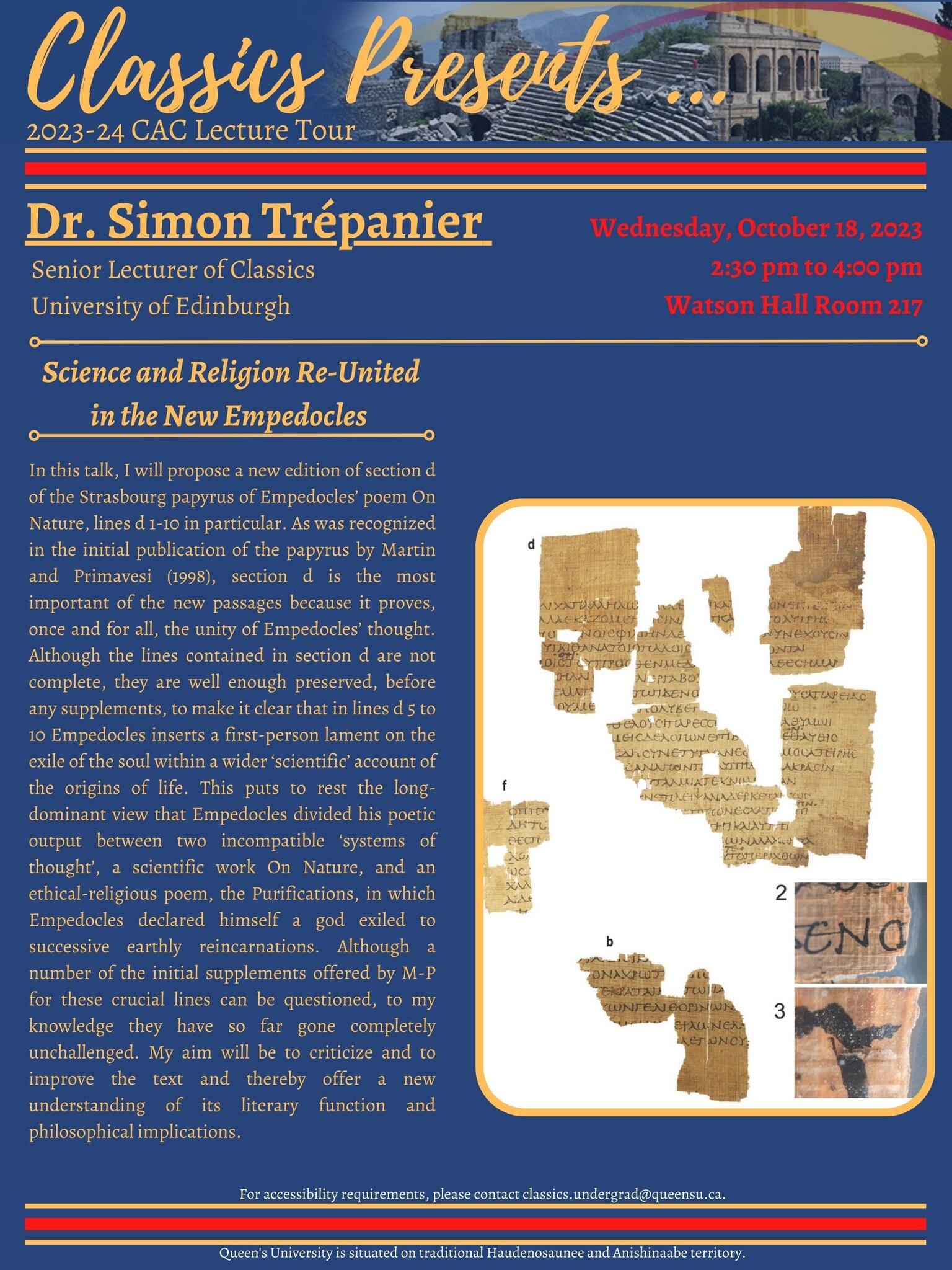
Dr. Simon Trepanier
Wednesday, October 18th, 2023, from 2:30pm - 4:00pm, in Watson Hall 217
Science and Religion Re-United in the New Empedocles
In this talk, I will propose a new edition of section d of the Strasbourg papyrus of Empedocles’ poem On Nature, lines d 1-10 in particular. As was recognized in the initial publication of the papyrus by Martin and Primavesi (1998), section d is the most important of the new passages because it proves, once and for all, the unity of Empedocles’ thought. Although the lines contained in section d are not complete, they are well enough preserved, before any supplements, to make it clear that in lines d 5 to 10 Empedocles inserts a first-person lament on the exile of the soul within a wider ‘scientific’ account of the origins of life. This puts to rest the long-dominant view that Empedocles divided his poetic output between two incompatible ‘systems of thought’, a scientific work On Nature, and an ethical-religious poem, the Purifications, in which Empedocles declared himself a god exiled to successive earthly reincarnations. Although a number of the initial supplements offered by M-P for these crucial lines can be questioned, to my knowledge they have so far gone completely unchallenged. My aim will be to criticize and to improve the text and thereby offer a new understanding of its literary function and philosophical implications.
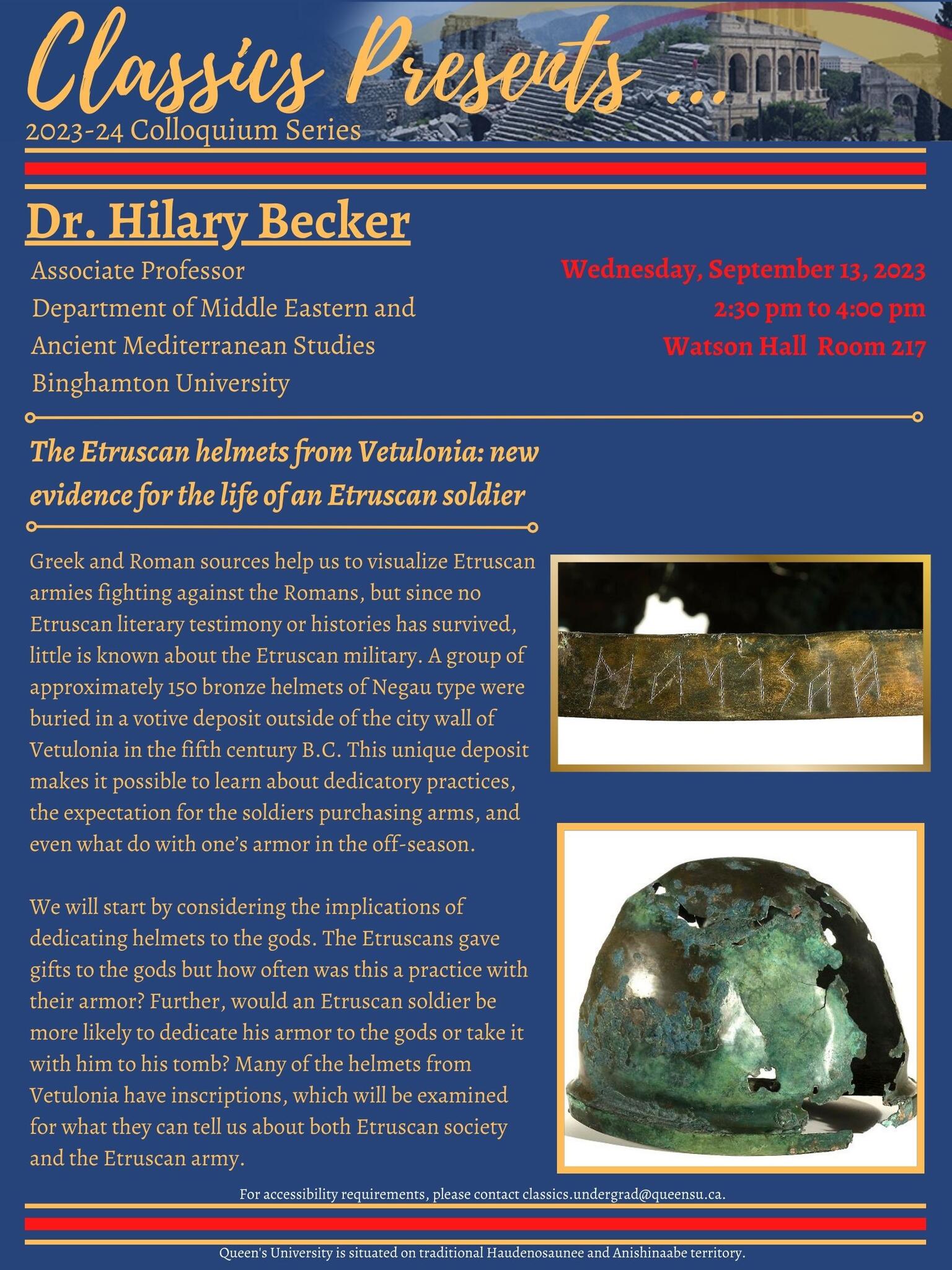
Hilary Becker
Wednesday, September 13, 2023, from 2:30 - 4:00 pm in Watson Hall Room 217
The Etruscan helmets from Vetulonia: new evidence for the life of an Etruscan soldier
Greek and Roman sources help us to visualize Etruscan armies fighting against the Romans, but since no Etruscan literary testimony or histories has survived, little is known about the Etruscan military. A group of approximately 150 bronze helmets of Negau type were buried in a votive deposit outside of the city wall of Vetulonia in the fifth century B.C. This unique deposit makes it possible to learn about dedicatory practices, the expectation for the soldiers purchasing arms, and even what do with one’s armor in the off-season.
We will start by considering the implications of dedicating helmets to the gods. The Etruscans gave gifts to the gods but how often was this a practice with their armor? Further, would an Etruscan soldier be more likely to dedicate his armor to the gods or take it with him to his tomb? Many of the helmets from Vetulonia have inscriptions, which will be examined for what they can tell us about both Etruscan society and the Etruscan army.
Winter 2023
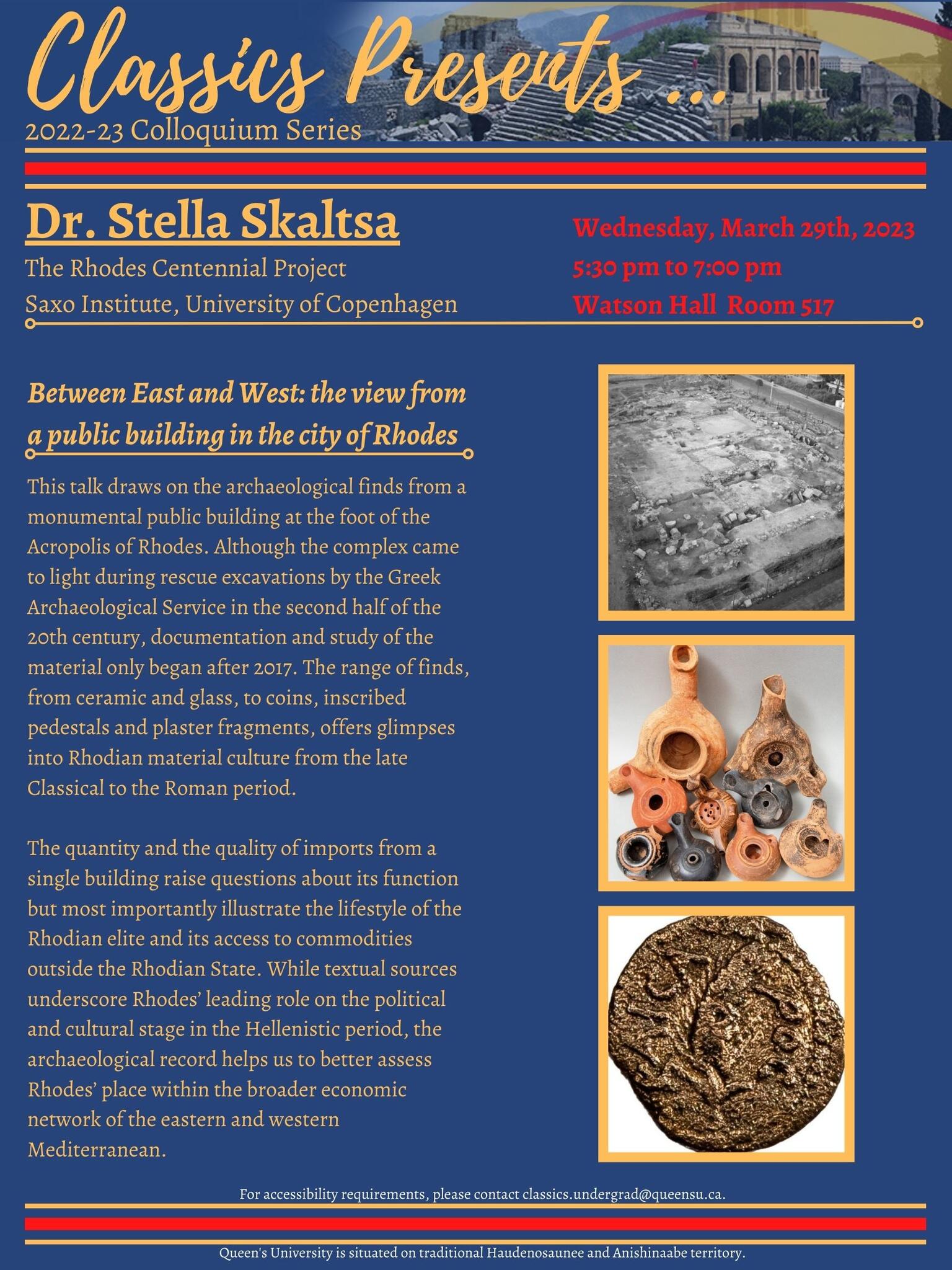
Dr. Stella Skaltsa
Wednesday, March 29th, 2023, from 5:30PM - 7:00PM in Watson Hall Room 517.
Between East and West: the view from a public building in the city of Rhodes
This talk draws on the archaeological finds from a monumental public building at the foot of the Acropolis of Rhodes. Although the complex came to light during rescue excavations by the Greek Archaeological Service in the second half of the 20th century, documentation and study of the material only began after 2017. The range of finds, from ceramic and glass, to coins, inscribed pedestals and plaster fragments, offers glimpses into Rhodian material culture from the late Classical to the Roman period. The quantity and the quality of imports from a single building raise questions about its function but most importantly illustrate the lifestyle of the Rhodian elite and its access to commodities outside the Rhodian State. While textual sources underscore Rhodes’ leading role on the political and cultural stage in the Hellenistic period, the archaeological record helps us to better assess Rhodes’ place within the broader economic network of the eastern and western Mediterranean.
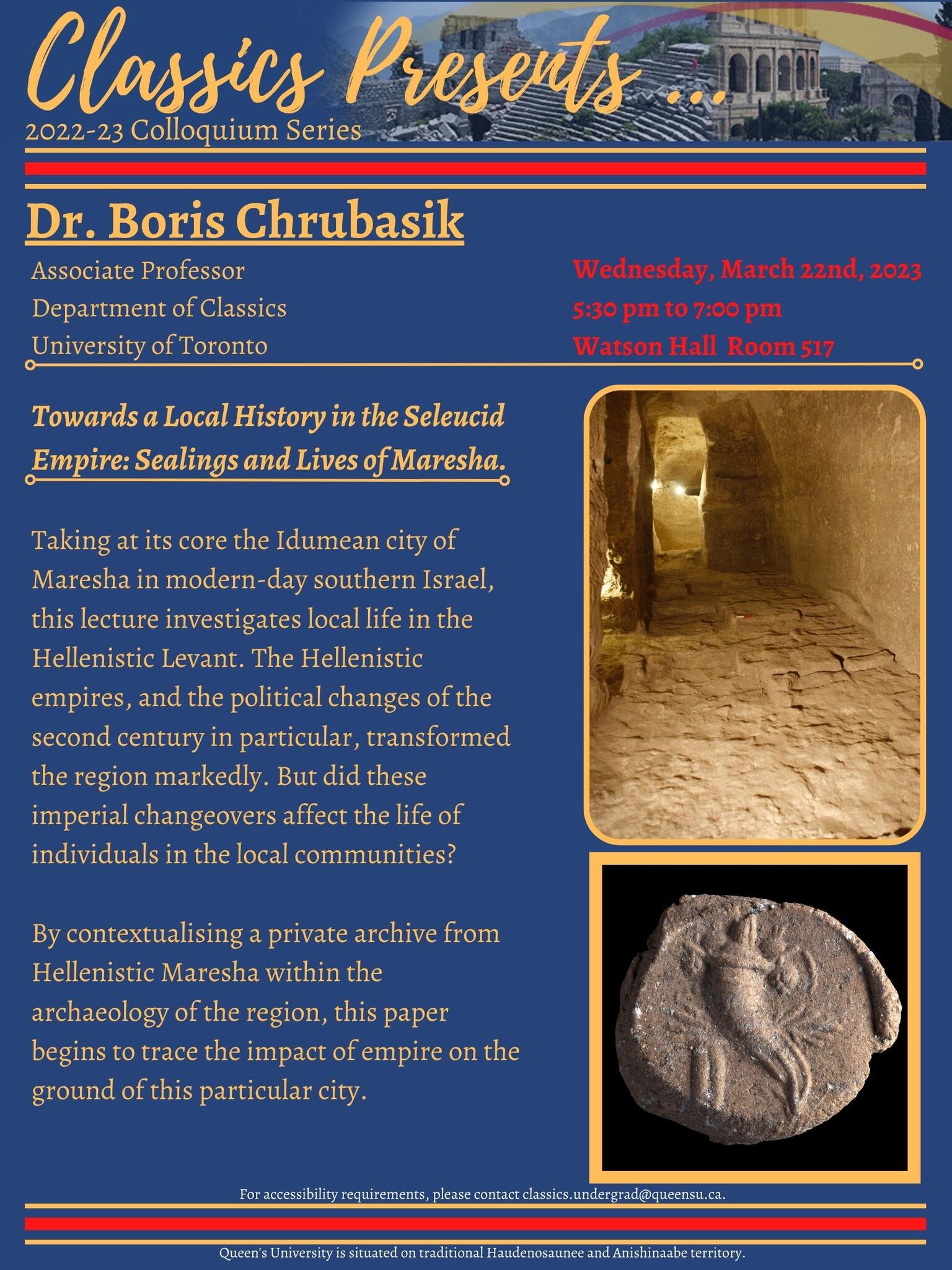
Dr. Boris Chrubasik
Wednesday, March 22nd, 2023, from 5:30PM - 7:00PM in Watson Hall Room 517.
Towards a Local History in the Seleucid Empire: Sealings and Lives of Maresha.
Taking at its core the Idumean city of Maresha in modern-day southern Israel, this paper investigates local life in the Hellenistic Levant. The Hellenistic empires, and the political changes of the second century in particular, transformed the region markedly. But did these imperial changeovers affect the life of individuals in the local communities? By contextualising a private archive from Hellenistic Maresha within the archaeology of the region, this paper begins to trace the impact of empire on the ground of this particular city.
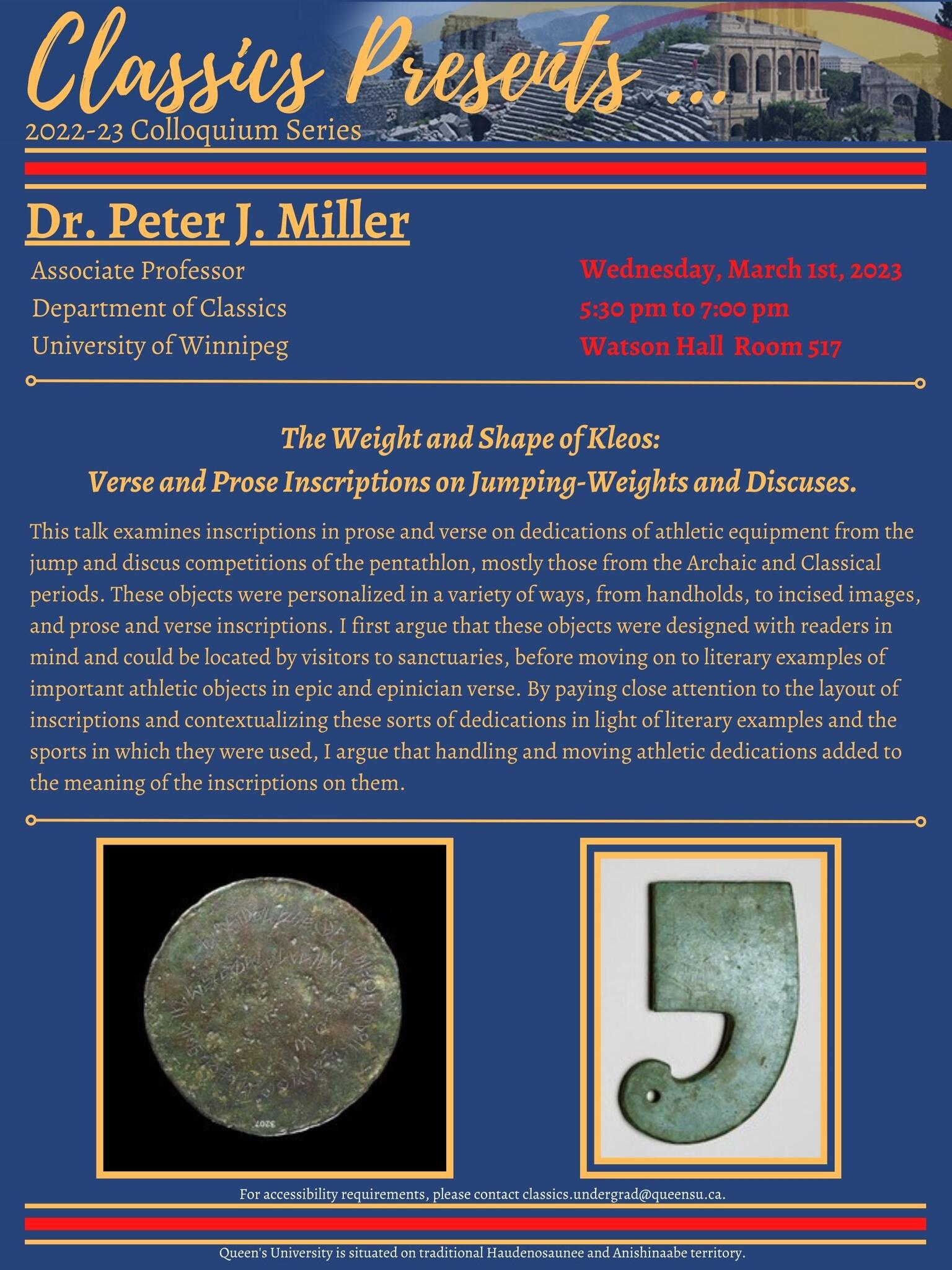
Dr. Peter J. Miller
Wednesday, March 1st, 2023, from 5:30PM - 7:00PM in Watson Hall Room 517.
The Weight and Shape of Kleos: Verse and Prose Inscriptions on Jumping-Weights and Discuses
This talk examines inscriptions in prose and verse on dedications of athletic equipment from the jump and discus competitions of the pentathlon, mostly those from the Archaic and Classical periods. These objects were personalized in a variety of ways, from handholds, to incised images, and prose and verse inscriptions. I first argue that these objects were designed with readers in mind and could be located by visitors to sanctuaries, before moving on to literary examples of important athletic objects in epic and epinician verse. By paying close attention to the layout of inscriptions and contextualizing these sorts of dedications in light of literary examples and the sports in which they were used, I argue that handling and moving athletic dedications added to the meaning of the inscriptions on them.
.jpg)
Dr. Anthony D'Elia
Wednesday, February 15th, 2023, from 5:30PM - 7:00PM in Watson Hall Room 517.
Roman Virtue, Violent Spectacle, and Gender in the Works of Petrarch
Petrarch (1304-1374) was obsessed with ancient Roman virtue. His writings are filled with the Stoic teachings and the stories of Roman heroes. My talk centers on Petrarch’s reception of Roman virtue in the works of Cicero, Livy, and Virgil. Gladiators, soldiers, and Rome’s great heroes were all models of masculine Stoic virtue in bravely accepting death, following orders, and suffering pain. Roman history and virtue are prominent themes in Petrarch’s letters, dialogues, and especially in his lengthy Latin epic, modeled on the Aeneid, the Africa, about the second Punic war, featuring Scipio, Hannibal, and the North African queen, Sofonisba. Petrarch appropriated, criticized, and recast these ancient stories to fit his Christian age. Petrarch not only wrote in Classical Latin but also applied the lessons of the ancients to the problems of his times.
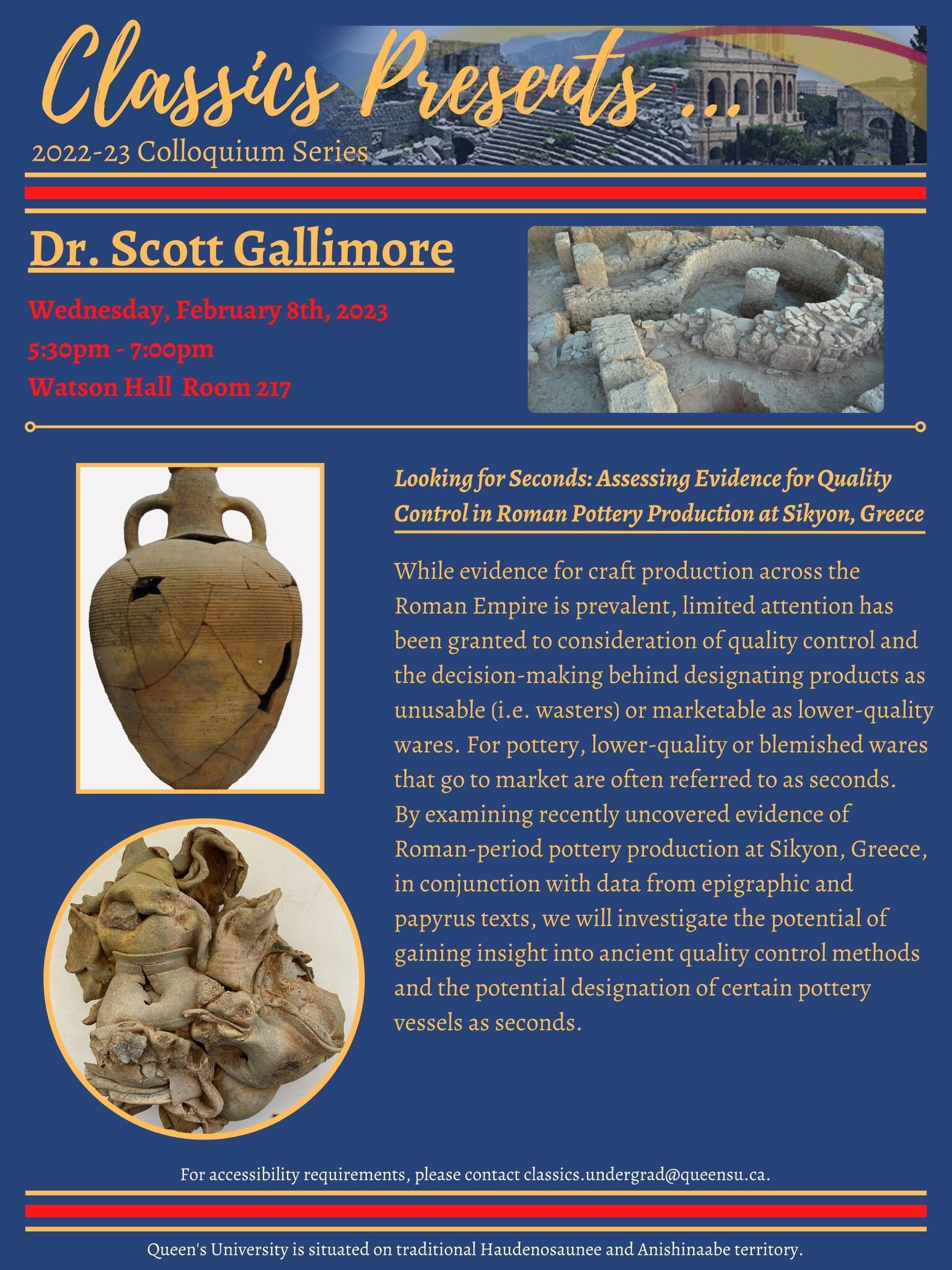
Dr. Scott Gallimore
Wednesday, February 8th, 2023 from 5:30PM - 7:00PM in Watson Hall Room 217.
Looking for Seconds: Assessing Evidence for Quality Control in Roman Pottery Production at Sikyon, Greece
While evidence for craft production across the Roman Empire is prevalent, limited attention has been granted to consideration of quality control and the decision-making behind designating products as unusable (i.e. wasters) or marketable as lower-quality wares. For pottery, lower-quality or blemished wares that go to market are often referred to as seconds. By examining recently uncovered evidence of Roman-period pottery production at Sikyon, Greece, in conjunction with data from epigraphic and papyrus texts, we will investigate the potential of gaining insight into ancient quality control methods and the potential designation of certain pottery vessels as seconds.
Fall 2022
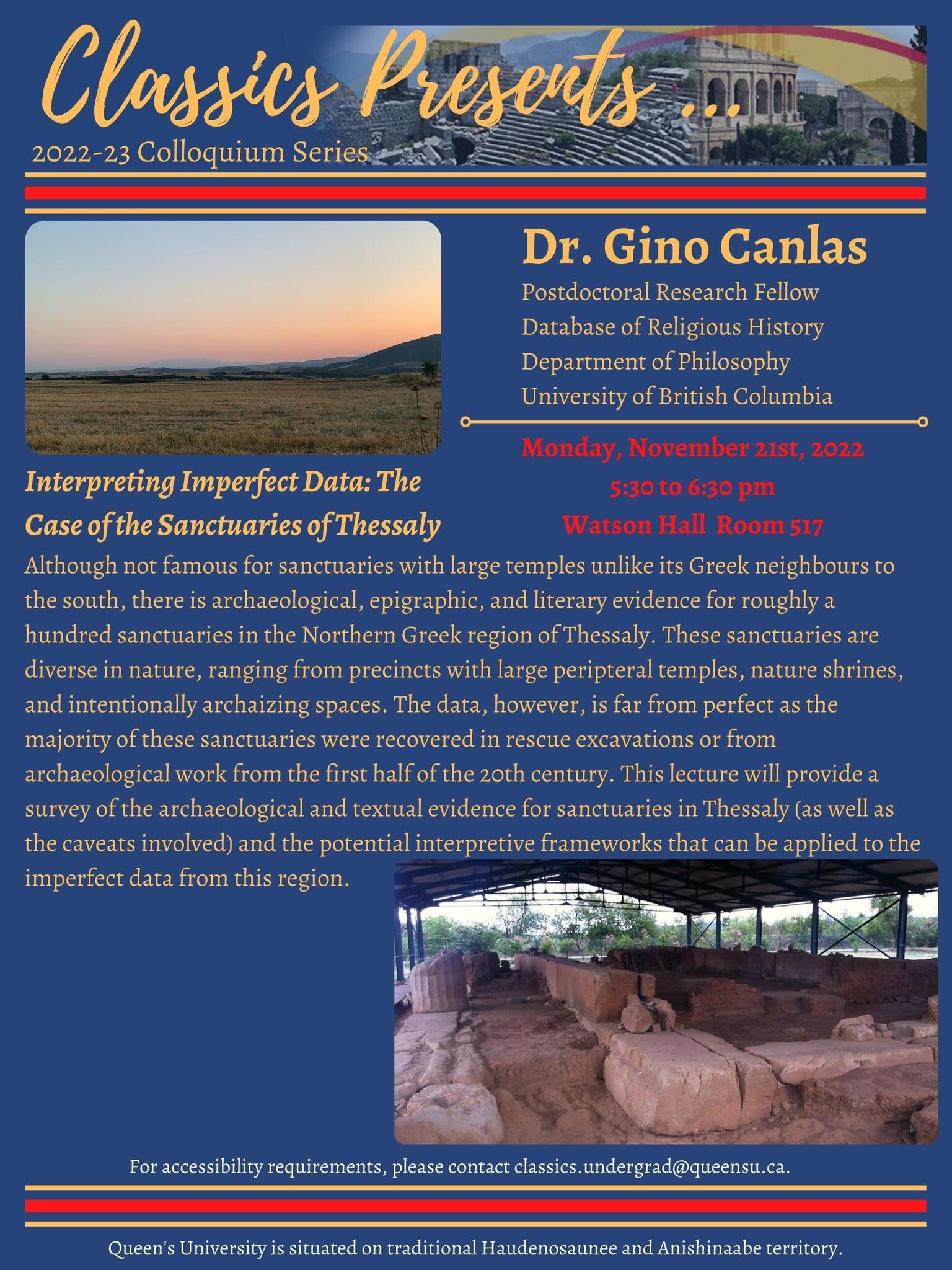
Dr. Gino Canlas
Postdoctoral Research Fellow
Database of Religious Studies
Department of Philosophy at the University of British Columbia
Monday, November 21st, 2022 from 5:30 - 6:30 pm, in Watson Hall Room 517.
Interpreting Imperfect Data: The Case of the Sanctuaries of Thessaly
Although not famous for sanctuaries with large temples unlike its Greek neighbours to the south, there is archaeological, epigraphic, and literary evidence for roughly a hundred sanctuaries in the Northern Greek region of Thessaly. These sanctuaries are diverse in nature, ranging from precincts with large peripteral temples, nature shrines, and intentionally archaizing spaces. The data, however, is far from perfect as the majority of these sanctuaries were recovered in rescue excavations or from archaeological work from the first half of the 20th century. This lecture will provide a survey of the archaeological and textual evidence for sanctuaries in Thessaly (as well as the caveats involved) and the potential interpretive frameworks that can be applied to the imperfect data from this region.
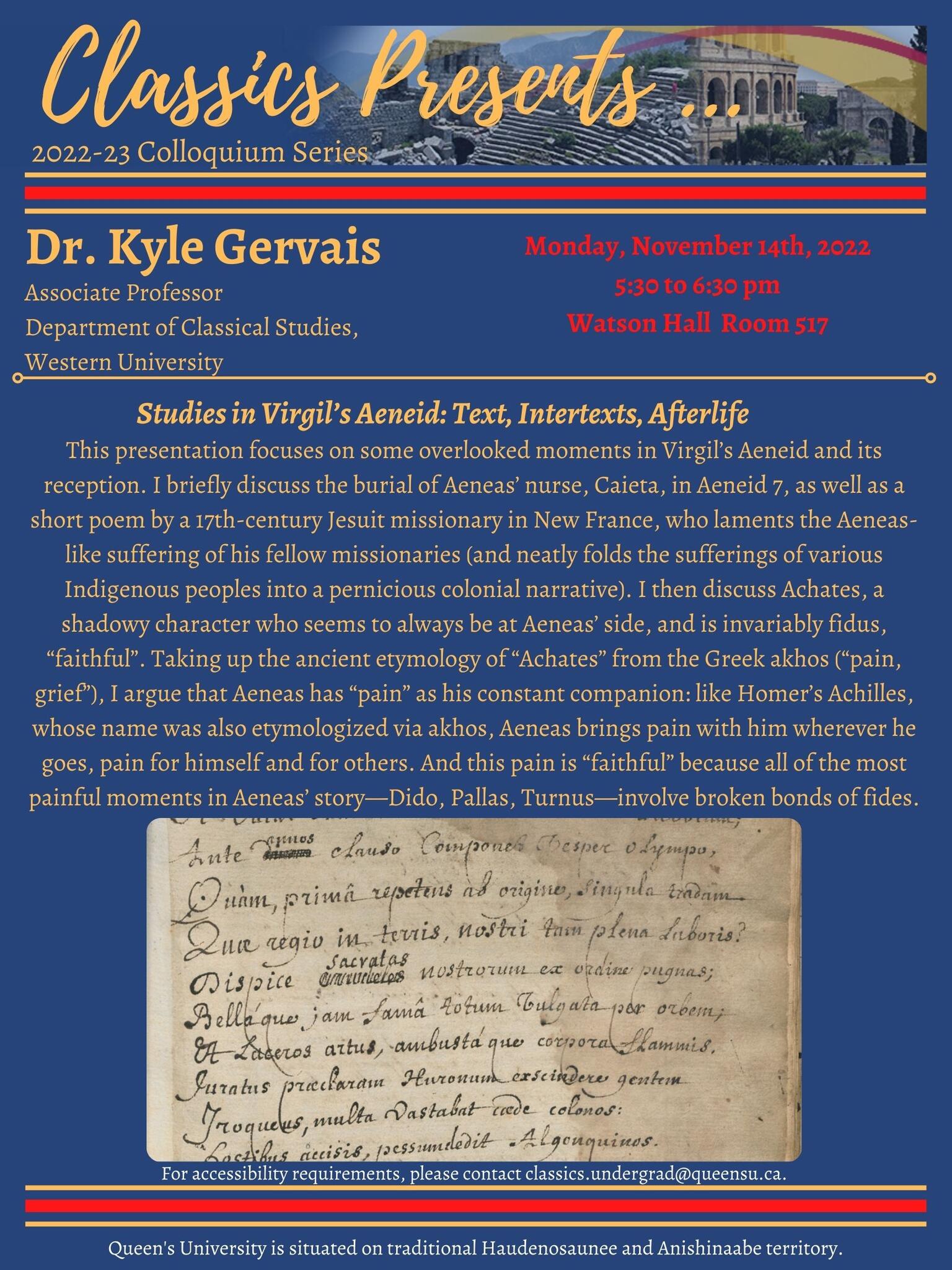
Dr. Kyle Gervais
Associate Professor
Department of Classical Studies at Western University
Monday, November 14th, 2022 from 5:30 - 6:30 pm, in Watson Hall Room 517.
Studies in Virgil’s Aeneid: Text, Intertexts, Afterlife
This presentation focuses on some overlooked moments in Virgil’s Aeneid and its reception. I briefly discuss the burial of Aeneas’ nurse, Caieta, in Aeneid 7, as well as a short poem by a 17th-century Jesuit missionary in New France, who laments the Aeneas-like suffering of his fellow missionaries (and neatly folds the sufferings of various Indigenous peoples into a pernicious colonial narrative). I then discuss Achates, a shadowy character who seems to always be at Aeneas’ side, and is invariably fidus, “faithful”. Taking up the ancient etymology of “Achates” from the Greek akhos (“pain, grief”), I argue that Aeneas has “pain” as his constant companion: like Homer’s Achilles, whose name was also etymologized via akhos, Aeneas brings pain with him wherever he goes, pain for himself and for others. And this pain is “faithful” because all of the most painful moments in Aeneas’ story—Dido, Pallas, Turnus—involve broken bonds of fides.
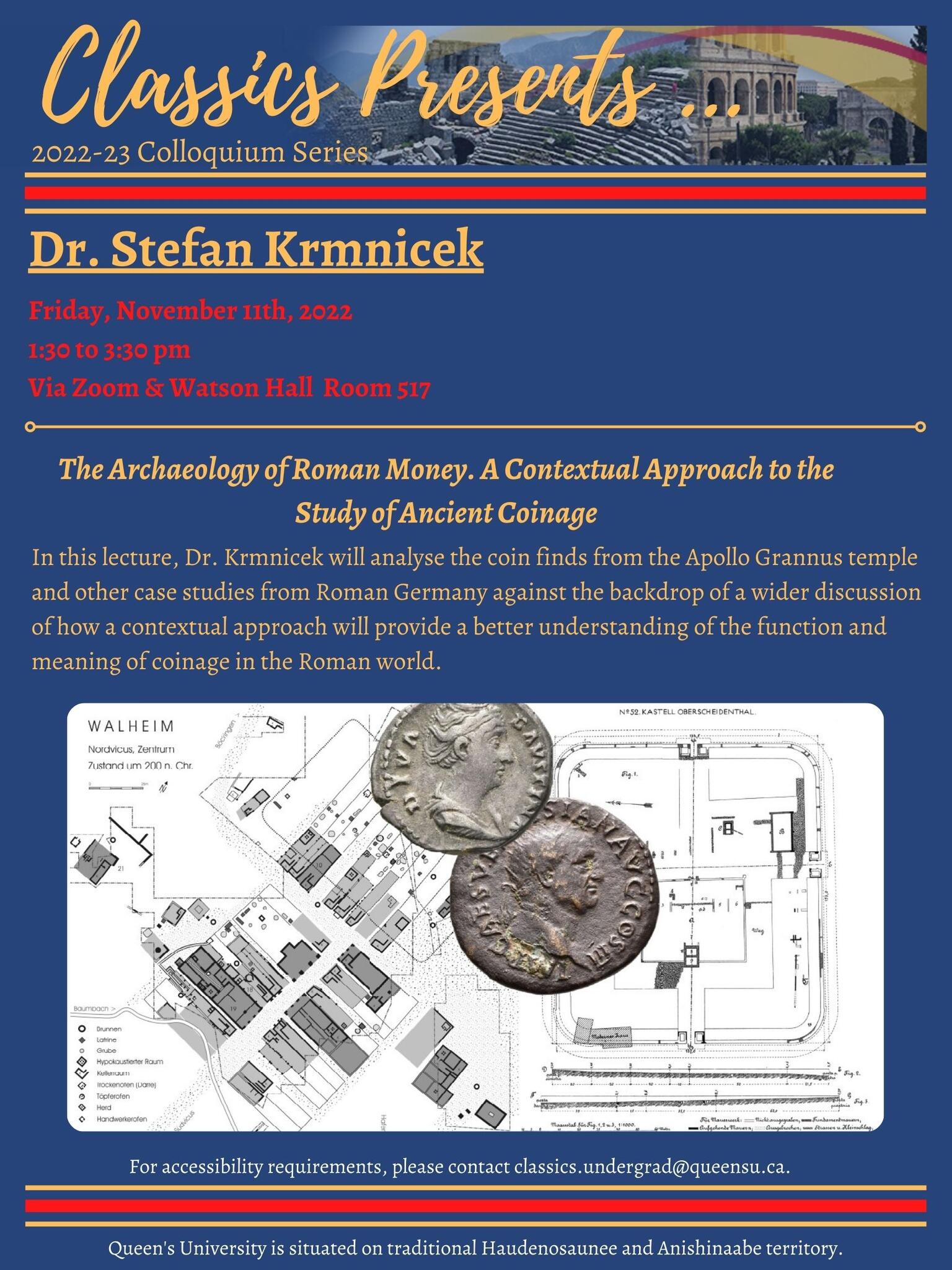
Dr. Stefan Krmnicek
Friday, November 11th, 2022 from 1:30 - 3:30 pm, in Watson Hall Room 517 and via Zoom.
The Archaeology of Roman Money. A Contextual Approach to the Study of Ancient Coinage.
"In this lecture, Dr. Krmnicek will analyse the coin finds from the Apollo Grannus temple and other case studies from Roman Germany against the backdrop of a wider discussion of how a contextual approach will provide a better understanding of the function and meaning of coinage in the Roman world."

